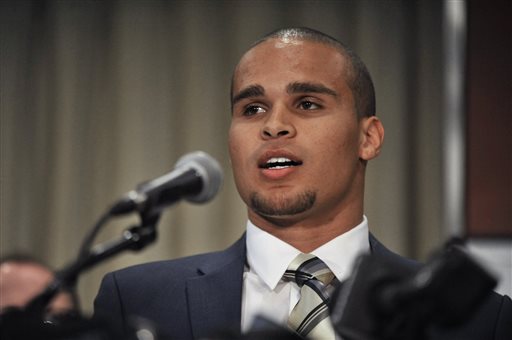Congratulations, 2014 national signing day class.
Today you will take your first small step toward your dream of financial security through football. You no doubt view that today as parlaying the college scholarship you are accepting into a future spot in the National Football League and the million-dollar contract that might arrive with that job.
And that could happen. Not likely. No more than five percent of Division I football players ever play a down in a regular-season NFL game. That's not the number who make a career of it. That's the percent who cash one paycheck beyond the exhibition season.
But, hey, given that 96 to 97 percent of high school players never even play college football, you've already beaten high odds to reach this magical day. So thank your parents for giving you the athletic genes and work ethic to get this far. Also thank your high school coaches and teachers for all their hard work in not only teaching you the sport, but also helping you become academically eligible to receive a scholarship, whichever level of the sport you're about to play -- FBS, FCS, Division II, NAIA or NJCAA.
Then brace yourselves for a college athletics landscape that we might not recognize four or five years from now. One filled with unions and stipend checks and trust funds built on royalty money from jersey sales for when your college careers are complete.
At least that's what a growing number of current football players hope, especially those at private colleges such as Northwestern, where a number of Wildcats are forming a labor union for college athletes known as the College Athletes Players Association. Because of various competing laws involving public universities, the National Labor Relations Act applies only to private schools.
Which brings us to last week's news conference with former Northwestern quarterback Kain Colter, who outlined the players' reasons for the union by stating: "My goal is to make sure that all student athletes are set up for success long after their playing days are over. We need to eliminate unjust NCAA rules that create physical, academic and financial hardships for college athletes across the nation."
Local attorney Jerry Summers is no rookie when it comes to labor law. He also competed in three sports at Central High School before playing college baseball at Sewanee for former Tennessee football coach Johnny Majors' father, Shirley.
While noting that any union is only as good as its leadership, Summers said Tuesday, "If this gets formed and it focuses its attention on the college athlete's safety and education, I think it could be a good thing."
Indeed, as more and more information is known about safety, especially head-related injuries, it would seem incumbent on the NCAA, as well as individual institutions, to not only do more to prevent head injuries but to provide blanket medical coverage for those suffering such injuries while representing their specific college or university.
And let's be blunt here. Should an athlete at Tennessee, Alabama or Vanderbilt fall victim to such an injury, those universities' medical centers could absorb the financial hits as a cost of doing business. It certainly could leave a less expensive paper trail than for the average citizen.
But whatever the cost, it's the right thing to do, which is why unions exist to begin with, because too often private enterprise has done the wrong thing by its employees as a nod to the almighty dollar.
Yet assigning financial worth to an individual collegiate athlete is also a tricky thing beyond the marketing of his specific jersey number or, perhaps, a video game. While every Tennessee football fan might list Peyton Manning as the most important Vol of the past 50 years, the Big Orange didn't win the 1998 national championship with Peyton under center. It won it with Tee Martin the year after Manning graduated.
And if you pay the football players who make money for the school, what do you do with the tennis players and golfers who don't, yet may put in every bit as much practice time?
What needs to be far more strongly embraced is the long-term importance of a college degree. A recent Georgetown University study revealed that individuals with bachelor's degrees will make 84 percent more in their lifetimes than those with high school diplomas only.
Even those who reach the NFL are greatly helped by a degree. According to the NFL Players' Association, players with degrees earn 20 to 30 percent more over their football careers than players without degrees, and they have football careers that last about 50 percent longer.
Yet the public seems less and less inclined to embrace this fact, focusing instead on what it believes these athletes should be paid for the brief period of time they're in college.
What everyone in this 2014 signing class should most understand is that the one thing they can't take away from you is a college degree. You can be injured, you can fail to make the pros, you can fall on hard times. But as long as you've earned a diploma, you have a foundation to fall back on.
So as this signing class celebrates its opportunity to play football for at least four more years, let it also celebrate its greater accomplishment -- a free college education. Then let us all hope that every level of football joins together to make the sport safe enough for these young men to remember moments such as today for the rest of their lives.
Contact Mark Wiedmer at mwiedmer@timesfreepress.com.


